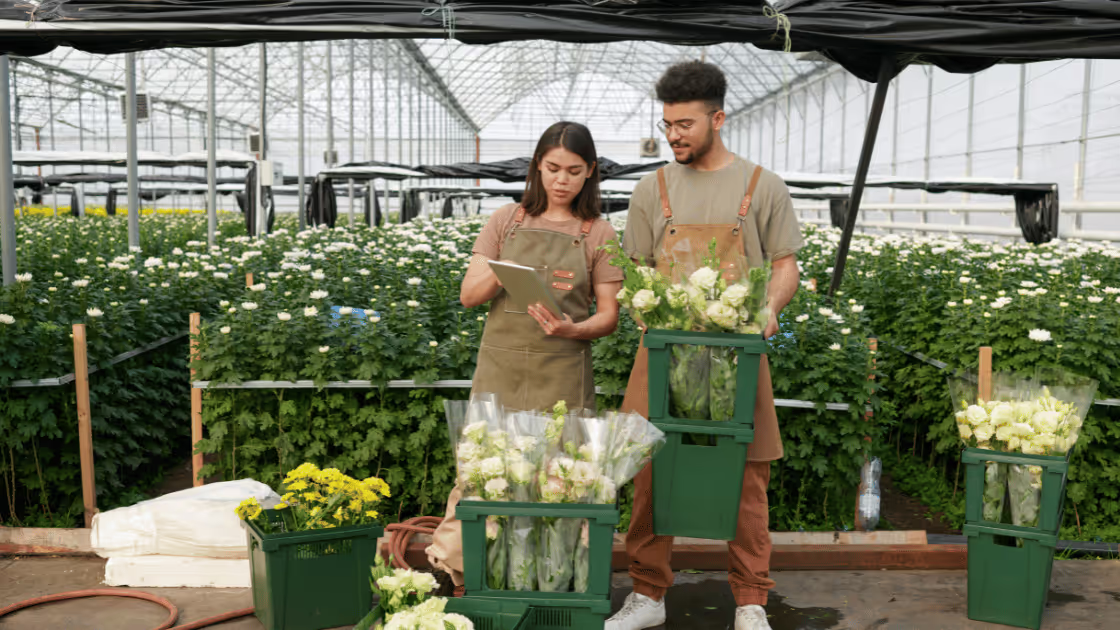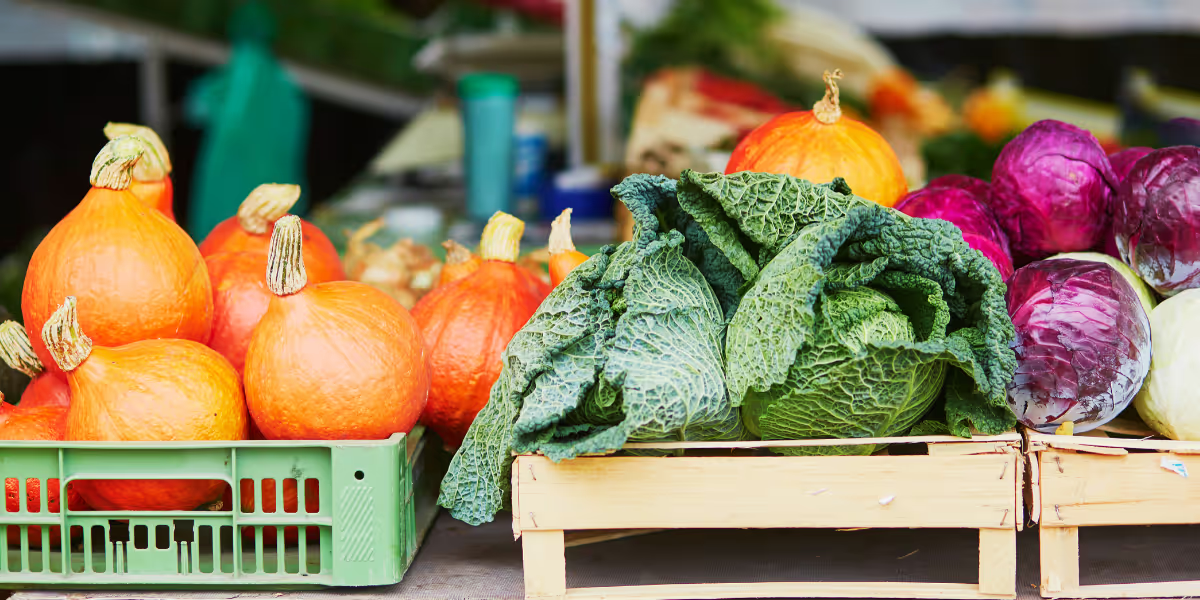Free Workshop | Farm Marketing Meets AI: Learn ChatGPT Workflows for Busy Farmers
.webp)
+1 (855) 699 1026

Selling flowers and floral arrangements online isn’t as simple as setting up a storefront and taking orders. Whether you’re a flower farm offering bouquet subscriptions, selling wholesale to florists, or running a flower hub or co-op, the floral industry brings unique challenges. You’re managing perishable inventory, tight delivery windows, seasonal availability, and customers who expect fast, often same-day, service. Most e-commerce platforms are built for general retail and don’t reflect the day-to-day realities of running a floral business.
When your software can’t handle delivery cutoffs, real-time stock, or local delivery zones, you’re left with more manual work and greater risk of errors. That makes it harder to meet customer expectations, scale your operations, or compete with larger services and local florists using purpose-built tools.
In this guide, we’ll cover what to look for in a flower e-commerce platform, how the top options compare, and which platform gives you the most flexibility and control to grow a profitable, delivery-focused floral business.
You can sell flowers online using e-commerce platforms like Local Line, Shopify, or Floranext that support online floral delivery services, subscriptions, and real-time inventory.
The key is choosing a platform that fits how you actually operate, whether that means same-day local delivery, weekly bouquet subscriptions, or operating as a co-op or selling through a shared storefront.
The right software doesn’t just take orders; it helps you stay organized, reduce waste, and grow your business with less stress.
Choosing the right flower eCommerce app is foundational to running a smooth and profitable flower business. From managing perishables to coordinating delivery windows, the software you use should reflect how florists actually operate. Here's what to prioritize:
Because flowers are time-sensitive, your platform must support reliable local delivery and pickup workflows. Look for:
Read more about how to offer home delivery for your farm or floral business.
Flowers aren’t static inventory. They spoil, shift with the seasons, and often change based on availability. Your platform should allow you to:
Read more about reducing overselling and stockouts.
Many florists rely on repeat business through weekly arrangements, seasonal subscriptions, or corporate clients. Look for software that supports:
Read more about how to sell subscription boxes.
Online flower shoppers expect a seamless, mobile-friendly experience with clear delivery details and appealing visuals. Prioritize:
Read more about how to build a website for your flower farm.
Your platform should support the tools you already use and help new customers find you locally. Make sure it includes:
Download our FREE SEO checklist for flower farms
Avoid platforms that charge commissions on every sale or require costly add-ons just to access core florist features. Also factor in payment processing fees, which many platforms charge separately (usually a percentage per transaction). Look for:
Using these criteria as a checklist helps you choose a platform that supports your margins and scales with your flower business over time.
Here are the 10 best e-commerce platforms that florists are using to sell flowers online, each offering a different balance of features, flexibility, and support for delivery-based businesses.
Local Line is an e-commerce platform purpose-built for farms and local food producers, and it has quickly become a top choice for florists, especially those offering bouquet subscriptions, managing weekly deliveries, or operating through farmers' markets, CSAs, or co-op storefronts. It stands out as one of the few tools that truly support a flower hub or collective model, making it ideal for growers and producers selling through a shared storefront while keeping their inventory and sales separate.
Strengths:
Limitations:
Local Line does not currently support third-party shipping or long-distance carrier integrations. It’s best suited for businesses focused on local delivery and pickup.
Best for: Flower farms, flower hubs, bouquet subscription services, co-ops, CSA programs, and shared storefronts selling fresh, locally grown floral products.
Pricing: Starts at $99/month, plus transaction fees
Try Local Line - there’s no credit card required to get started
Shopify is a flexible and widely adopted e-commerce platform that supports everything from local delivery florists to large-scale online retailers. Its real value lies in its app ecosystem and multi-channel capabilities.
Strengths for florists:
Limitations:
Best for: Florists who want complete branding control, multi-channel sales, and flexibility to scale, particularly retail shops with physical locations.
Pricing: Starts at $39/month for basic eCommerce features to $2,300/month for enterprise capabilities, plus additional costs for transaction fees and third-party plugins and apps
Floranext is built specifically for florists, offering a unified system that includes a florist website, POS, delivery manager, and wedding/event proposal tools.
Strengths for florists:
Limitations:
Best for: Brick-and-mortar flower shops that want a florist-first system combining POS, website, and event management in one.
Pricing: Starts at $30/month
Wix is a beginner-friendly website builder with solid eCommerce capabilities. It offers several floral templates and is a go-to choice for new or boutique florists who want a beautiful online presence without a steep learning curve.
Strengths for florists:
Limitations:
Best for: Boutique or design-driven florists getting started with online sales and prioritizing aesthetics and simplicity.
Pricing: $29/month for basic eCommerce features to $159/month for more advanced capabilities, plus transaction fees
Squarespace is best known for its high-end design and elegant templates. While not florist-specific, it offers enough flexibility to serve event florists or studios focused on branding and customer experience.
Strengths for florists:
Limitations:
Best for: Brand-forward floral studios or event florists who value design, storytelling, and clean content presentation over high-volume order handling.
Pricing: Starts at $25/month, plus transaction fees
BigCommerce is an enterprise-grade platform with deep customization options, powerful inventory tools, and support for large catalogs and high-volume sales.
Strengths for florists:
Limitations:
Best for: Larger or rapidly growing floral businesses that need scalability, complex product structures, or enterprise integrations.
Pricing: $39/month, plus transaction fees
Gather Flora is a marketplace that connects florists, planners and retailers with local and regional flower farms, with a strong focus on seasonal and sustainably grown flowers.
Strengths for florists:
Limitations:
Best for: Florists and planners who want reliable local sourcing and premium seasonal stems.
Pricing: Gather Flora does not take a percentage of your listed price. Instead, the platform adds a small markup to the final sale price paid by the buyer.
Rooted Farmers offers a curated marketplace along with farm management tools for inventory, orders and cooperative sales.
Strengths for florists
Limitations:
Best for: Flower farms, hubs and co-ops that want to streamline sales and fulfillment.
Pricing: Starts at $14/per month, plus transaction fees
GrownBy is a cooperative platform that supports direct to consumer sales, CSA subscriptions and local flower or produce marketplaces.
Strengths for florists:
Limitations:
Best for: Growers and co-ops that value local relationships and community driven marketplaces.
Pricing: Free retail plan plus paid plans at $50 or $95 per month, plus transaction fees, a 2% co-op fee, and optional co-op membership discounts (for one-time fee of $250).
A quick look at how the top eCommerce platforms for florists compare across key features:
Choosing the right e-commerce platform for your flower business goes beyond checking for a shopping cart and a few templates. Here's how to evaluate options based on real florist needs:
Start by clarifying how your business operates:
Delivery is central to most floral businesses. Look at how your operations work:
Flowers are perishable, so the platform must support dynamic inventory:
Look beyond the base subscription:
Good floral marketing helps local customers find you quickly and place an order without friction. Because many flower purchases happen last minute and on mobile devices, make sure your online store can:
Most platforms offer free trials or demos, use them to test:
Tip: Simulate real-world use cases and ask fellow florists about their experiences with support, uptime, and hidden costs. Communities like Reddit often share honest feedback.
Even if you’re starting small, choose a platform that won’t limit you down the road:
Making a scalable choice today can save costly transitions later on.
If your flower business depends on fast local delivery, fresh inventory, and reliable order management, Local Line is built for you. Originally designed for farms and food producers, it’s become a powerful option for florists, especially those offering bouquet subscriptions, managing delivery routes, or selling through a co-op or collective model.
Here’s why Local Line stands out for flower farms and hubs:
If your business is rooted in local delivery, subscriptions, or farm-direct sales, Local Line provides the tools to simplify your day-to-day and grow sustainably. While platforms like Shopify or Floranext may be useful for retail-first or brand-heavy operations, Local Line is a better fit when freshness, logistics, and operational control matter most.
Get started with Local Line - it takes only minutes to get started!
For consumers, local florist websites often provide fresher flowers and faster delivery than large national chains. Platforms like BloomNation help surface local florist storefronts within a marketplace, while others like Local Line or Floranext support independent florists with more control over their orders and branding. For florists, the best software supports reliable local delivery, easy inventory updates, and customer satisfaction.
Selling flowers can be profitable when managed carefully. Key factors include reducing waste from perishables, streamlining delivery logistics, building repeat business through subscriptions, and pricing appropriately for your market. The right floral e-Commerce software supports all of this by helping you manage inventory, automate workflows, and improve the customer experience, which leads to higher margins and more consistent revenue.
Shopify is a solid choice for florists who want full design control, access to a wide range of marketing tools, and the ability to sell both in-store and online. However, it often requires third-party apps to handle essential florist features like delivery zones, order cutoffs, and subscription management, which can add complexity and cost. For flower farmers, co-ops, and florists offering bouquet subscriptions or managing local deliveries, Local Line is often a better fit. It was built for businesses handling perishable, locally delivered goods and supports shared storefronts, recurring orders, and customizable delivery settings without needing extra plugins.
Roses are the most profitable flower to sell online due to high year-round demand and strong seasonal spikes during holidays like Valentine's Day. Tulips, sunflowers, and daffodils are also popular in seasonal and farm-style arrangements. For weddings or high-end designs, peonies and ranunculus command premium prices but have limited seasonal availability. Mixed bouquets tend to offer higher average order values and help reduce waste by using a variety of stems. Selling what is fresh, in season, and locally available helps improve margins and customer satisfaction.
Flower farms typically use e-commerce platforms that support seasonal inventory, delivery scheduling, and subscriptions. Tools like Local Line, Shopify, Rooted Farmers, and GrownBy allow you to offer bouquet subscriptions, weekly deliveries, or CSA-style floral shares. Local Line is especially strong for farms because it supports recurring orders, delivery cutoffs, and real-time inventory for perishable products.
Flower hubs and co-ops need software that can manage multiple vendors, shared storefronts, separate payouts, and local delivery routes. Platforms like Local Line and Rooted Farmers are built for this model, letting each grower manage their own inventory while selling through a unified online store. This makes them ideal for regional flower hubs, collectives, and wholesale markets.
At a minimum, your floral e-commerce platform should support:
Yes. Many flower farmers and hubs now sell wholesale directly to florists through online platforms. The best software for this supports bulk pricing, case/bunch units, standing orders, and delivery scheduling for florist accounts. Tools like Local Line and Rooted Farmers are strong options if you want to streamline wholesale ordering while still managing perishable, local inventory.
Florist websites (like Floranext) are typically designed for arrangements, gifts, and retail delivery. Farm/hub platforms (like Local Line, Rooted Farmers, or GrownBy) are built for:
If you're selling stems, bunches, or subscriptions, hub-style software is usually a better fit than retail florist software.


